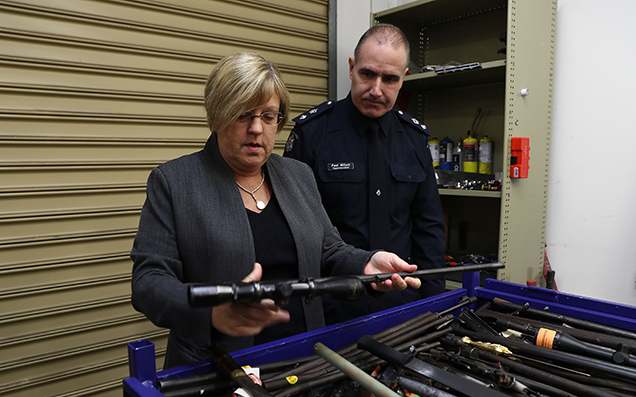
While the debate about guns and firearm control rages in the United States in the wake of another school mass-shooting, Government officials here in Australia are quietly touting the overwhelming success of the nation’s first gun amnesty since the Port Arthur massacre in 1996.
More than 57,000 illegal firearms were handed in during the amnesty period, which allowed people in possession of the guns to either register their weapons, sell them to a licensed dealer, or have them destroyed.
Of the 57,000 handed in during the window, nearly 2,500 were either fully-automatic or semi-automatic.
The amnesty period ran from July 1st until September 30th last year, meaning that while the window was open an average of 630 guns were handed into officials per day.
Approximately a third of the weapons handed in were destroyed by police officials, with a further third fully registered and the remainder sold off.
Of the total amount handed in, 35,182 were rifles, and an additional 12,279 were shotguns. Around 5,000 air rifles were surrendered, as were 2,901 handguns.
Among the rarer weapons seen during the amnesty were a home-made machine gun in South Australia, a highly-controlled Norinco SKK semi-automatic rifle in Tasmania which came in along with 1,000 rounds of ammunition, and even one rocket launcher in Queensland.
Officials stated that these previously-unregistered and undocumented weapons existed on what’s known as the “grey market”; firearms owned by private citizens not necessarily for criminal intent, but ones that can nonetheless fall into the hands of criminals. The weapon used in the Lindt Café Siege was acquired through these means, for example.
New South Wales surrendered the largest amount of firearms, with 24,831 handed in during the amnesty. Queensland followed in second with 16,375. Victoria surrendered a total of 9,175, and South Australia’s total numbered 2,825.
Meanwhile, Tasmania handed in 1,830, Western Australia gave up the surprisingly small number of 1,242, the ACT surrendered 699, and the Northern Territory 347.
Authorities stated that a further amnesty period would be possible, but it would require collaboration between state and Federal authorities.
Almost 11% of people survey throughout the amnesty period stated they handed in their weapons to avoid potential prosecution.



